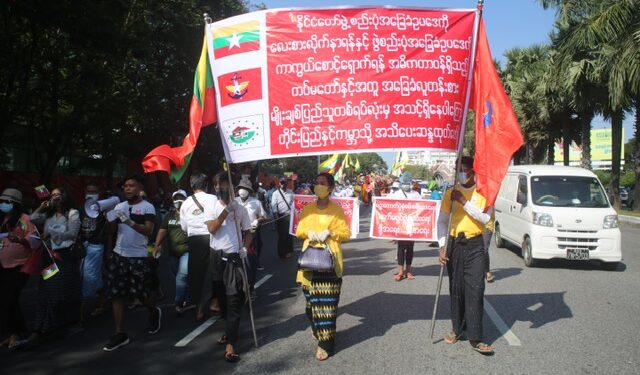Yangon – Yangon residents have called on the government to take action against the organizers of a Buddhist nationalist march which defied COVID-19 restrictions.
More than 200 nationalists, including Buddhist monks, joined a protest in solidarity with Myanmar’s military and to condemn the handling of the Nov. 8 general election. The march was led by Daw Moe Moe Khaing, central executive member of the Yeomanry Development Party, which was established by Michael Kyaw Myint, a Buddhist nationalist.
On Aug. 16 Myanmar banned gatherings of more than 29 people to curb the spread of COVID-19. Yangon residents have been ordered to stay at home while organizations and companies have been required to work from home since September.
The protesters marched from the Thamada cinema carrying banners calling for the prosecution of the chairman of the Union Election Commission, a probe into the commission and condemning those who breach the 2008 Constitution as “enemies of the people”.
Protesters did not observe social distancing and some leaders did not wear masks.
The Ministry of Health and Sports has ordered Yangon residents to wear face masks and stay six feet apart when outside.
Those failing to comply with COVID-19 restrictions can be prosecuted under the Natural Disaster Management Law, instead of the Communicable Disease Law, for harsher punishments.
Ko D Nyein Lynn, secretary of the Yangon Region Youth Committee, a voluntary group fighting COVID-19, told The Irrawaddy on Tuesday that the gathering breached health rules while the city is struggling to reduce cases. He called on the authorities to prevent further gatherings.
“COVID-19 orders are imposed for a reason. We need action against those breaching the orders. If only one infected person attended the gathering, others will have caught COVID-19,” said Ko D Nyein Lynn, who volunteers with COVID-19 patients at the city’s hospitals and quarantine centers. He has not returned home since March.
Yangon Regional lawmaker Daw Myat Hla San, representing Kyauktada, told The Irrawaddy that she had reported the protest to the township health authorities.
“Gatherings should not be taking place while we are just beginning to see COVID-19 infection rates decline in the city,” she said. “We are concerned that COVID-19 will increase if crowds gather.”
The township authorities said the protest was due to be limited to 30 people.
Kyauktada administration officer U Htoo Kyaw, who chairs the township’s COVID-19 prevention, control and treatment committee, told The Irrawaddy on Tuesday that the event had been reported to the regional government.
A decision on any further action would be taken at the district and regional levels, he said.
The regional government could not be reached for a comment on Tuesday.
Myanmar has signed a memorandum of understanding with the world’s largest vaccine manufacturer, the Serum Institute of India, to purchase COVID-19 vaccines for 15 million citizens.
Since Dec. 19, Myanmar has seen a decline in daily COVID-19 cases. Fewer than 1,000 new cases have been reported daily, down from more than 1,400 in previous weeks.
Fewer than 500 new coronavirus cases are being reported in Yangon, down from up to 1,900 cases per day in previous months. On Tuesday, Yangon reported 82,593 COVID-19 cases.
Since mid-November, Myanmar has seen a jump in daily COVID-19 cases from around 1,000 to more than 1,500 after several gatherings celebrating the election victory of the National League for Democracy in several major cities, including Yangon and Mandalay.
As of Monday, Myanmar has reported 122,534 COVID-19 cases, including 2,616 deaths and 104,351 recoveries.
On Monday, the country’s second-hardest-hit city, Mandalay, reported 13,410 COVID-19 cases.
It is followed by Bago Region, which on Tuesday reported 7,623 cases, Ayeyarwady Region with 4,666 cases and Rakhine State with 4,117 cases.
Cases have been reported in more than 200 townships across the country. Myanmar is third in terms of COVID-19 cases in Asean, behind Indonesia and the Philippines.

















